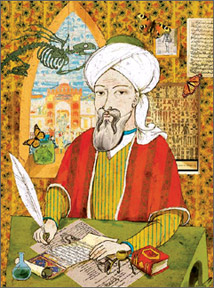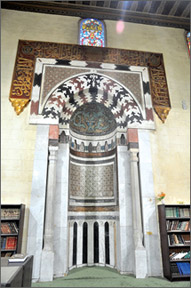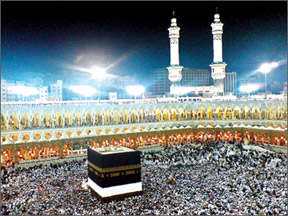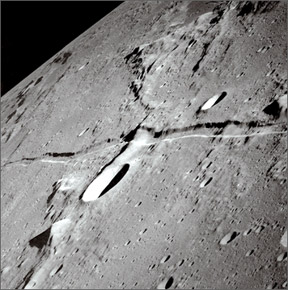ISLAM
Muslims - Founders of great libraries in history
|

Calligraphic work of Ibn Muqlah |
The human tendency of preserving the records of their achievements in
various fields of life is very primitive and dates back to the beginning
of civilization. Before the invention of paper, such records were laid
down on stone slabs, clay tablets, parchments, leather and pieces of
wood. The temples and State archives of Assyria and Babylon contained
clay tablet libraries.
The first library in Greece owes its existence to Pesistratus, who
established it in Athens in 600 BC. The largest library, before the
advent of Islam was founded by Ptolemy in 287 - 84 BC at Alexandria,
which is alleged to contain about a quarter of million books.
|

Ibn Miskawayah |
The birth of Islam provided great impetus to human pursuits of
knowledge. The necessity of preserving the Quran and the Traditions (Hadith)
awakened the spirit of collecting such writings in various forms, paving
the way for the establishment of the earliest libraries in the world of
Islam. The mosques which formed the nerve centers of all political,
religious and educational activities, housed valuable libraries
comprising books on religion, philosophy and science.
Soon Muslims distinguished themselves as the greatest patrons of
learning, established during their glorious day. The great intellectuals
of their age including Avicenna the encyclopaedist, Ibn Miskawayh the
historian-philosopher, Al-Fadl-Ibn Naubakht and Humayun Ibn Ishaq the
renowned translator were entrusted with the responsibility for the
organization and maintenance of libraries. The Caliphate Raashidah and
that of the Omayyads were the periods of conquests, consolidation and
organization,
Abbasids
Under Mamun, the Muslims formed the vanguard of civilization. During
the time of the early Abbasid, caliph Mansur was the first who took an
active interest in the pursuits and propagation of learning. He founded
a translation department in which classical and scientific works were
translated from various languages into Arabic.
|

Al Azhar Mosque library |
The philosophical, mathematical and scientific works of Greek
masters, which otherwise would have remained buried in the dark recess
of the Greek Imperial Palaces, were brought within reach of the common
man by translating them into Arabic.
According to the celebrated Urdu historian Maulana Shibli Nomani, the
Darul Hukama (House of Wisdom) founded by Harun-ar-Rashid which was
divided into two sections-one was concerned with the translation work
and the other related to the collection of books and housed a big
library. Yahya Barmeki, the famous grand vazier of Harun had summoned
scholars from distant lands, who adorned the literary gatherings of the
great Caliph.
Harun-ar-Rashid who had founded a big library at Baghdad had
appointed Al-Fadl Ibn Naubakht, a renowned scholar and translator, as
head of his library - containing a large number of books efficiently
arranged and catalogued. Harun had a good taste for books and even
carried large number of books on his military and other expeditions.
Once, when he had gone to Riqqah, he took eight boxes of books with him.
His pleasure resort built on the bank of the Qatul canal, had a library
containing about 1,060 books.
The reign of Mamun-ar-Rashid (Augustus of the Arabs), formed the most
glorious period in the field of intellectual achievements of the
Muslims. He was the moving spirit behind the House of Wisdom employing
the best brains of the age and acquired astounding success in a short
span of 20 years. The library attached to the House of Wisdom was
enlarged and managed by Sahl bin Harun and Saeed bin Harun, the
Persians. A large collection of books of the pre-Islamic-era were added
to the library.
|

Parchment scroll |
The well-known book binder Ibn Abi-ul-Huraish was employed in the
library for binding work. Chief of the translation department Humayun
Ibn Ishaq was also made the librarian of this famous library. Among the
rare manuscripts preserved in the library were a document written on
parchment by Abdul Mutallib bin Hashim (grand-father of the Prophet) and
a few writings of Hazrat Ali and Imam Hasan.
The interest taken by the Caliph in the accumulation of literary
treasures created a taste for books not only in his associates but also
among the common man. A number of ministers, officials and wealthy
people established big libraries by spending large sums. Yahya Barmeki,
grand vazier of Harun, owned a big library which contained a large
collection of Persian and Greek manuscripts.
Three copies of each book were kept in his library, which after the
downfall of Barmekids were added to the Imperial library of Mamun. Fateh
bin Khakan, the vazier of Mutawakkil Billah founded a grand library
which contained rare books on astronomy.
Muhammad bin Abdul Malik Ziyat Prime Minister of Caliph Wasiq Billah
established a private library on which he spent ten thousand rupees. A
library was owned by Allama al-Waqidi, which was alleged to have
contained 600 camel loads of books mainly on historical subjects. The
libraries gained so much popularity that by the close of the 11 Century
AD there existed a network of libraries throughout the vast Abbasid
Empire and before the Mongol invasion, Baghdad alone had 36 big
libraries.
Public library
The first public library in Baghdad was opened by the Prime Minister
of the Buwayhid monarch Bahal al-Daulah Sabur bin Ardeshair. This was
attached to the academy built by him in Baghdad in 991 AD. Before the
establishment of this library, all libraries were privately owned, and
not open to the common man. This library of Sabur contained more than
ten thousand books. This led to the opening of private libraries in the
big cities of the Muslim countries including Baghdad, Cairo, Merv, Mosul
and Tripolis.
The big colleges and universities of Baghdad, Neshapur, Merv, Cairo,
Damascus, Isfahan and Ghazni including the world famous Nizamiyah and
Mustansariya of Baghdad housed’ splendid libraries. The principal
mosques of the big cities-of the world of Islam, which served as
teaching institutions, also had sections of libraries attached to them.
Egypt
The Rise of Cairo under al-Muiz-li-dinillah added a spirit of rivalry
in the patronage of learning between the caliphs of the Houses of Abbas
and Fatimah. Al-Muiz has been acclaimed as the Mamun of the west and the
Maecenas of Muslim Africa. The Fatimid caliphs Aziz and Hakim Billah
were also great patrons of learning.
Aziz has the distinction of adding an academy of higher education to
the famous Al-Azhar mosque which housed a big library containing
valuable books on Muslim theology, jurisprudence and philosophy. Caliph
Aziz is also credited with founding one of the biggest libraries ever
opened in the world of Islam. Allama Maqrizi has given its details in
his well-known work Kitab Al-Khatat-wal-Aasar.
This library was housed in a part of the Imperial palace and
comprised forty chambers. There has been difference of opinion among
writers about the total number of books possessed by this library.
According to the estimate of Ibn al-Tanvir it had 200,000 volumes,
according to Ibn Ali Wasli it had 160,000 and according to Ibn Abi Tai
it contained 600,000 volumes.
This famous library contained 18,000 books on ancient philosophy and
24,000 copies of the Holy Quran. Once there was a reference of Kitabul
Ain in the durbar of the Caliph Aziz, sent for from the library and the
librarian presented 30 different copies of the required book. One of
these copies was written in the hand of Khalil bin Ahmad Basri (author
of the book), this library possessed a globe made by Ptolemy which was
2,250 years old and another globe made by Abul Hasan Sufi for
Azud-al-Daulah which was purchased for 15 thousand rupees.
Among the rare manuscripts were specimens of the artistic writings of
the renowned calligraphist Ibn Muqlah and an autographed copy of the
history of Tabari. The Fatimid Caliph Al-Hakim laid the foundation of
Darul Ilum on the lines of Darul Hukama (House of Wisdom) of Mamun. It
was rather a rival institution and was equipped with a splendid library
on whose upkeep large sums were spent by its patron. Great scholars and
scientists were attached to the library, which was open to the public.
Students were encouraged in research work and special apartments were
reserved for the purpose. They were supplied with stationery free of
cost.
To be continued
Universality of the message of Islam
Is it true that Islam is a religion only for Arabs?:
This idea can be easily be disproved, as only about 15 to 20 percent
of Muslims in the world are Arabs. There are more Indian Muslims than
Arab Muslims and more Indonesian Muslims than Indian Muslims. This
assumption is possibly based on the fact that most of the first
generation of Muslims were Arabs, that the Qur’an is in Arabic and that
the Prophet Muhammad was an Arab.
|

Pilgrims praying at Mecca |
However, history testifies that the Prophet, his followers and the
early Muslims made every effort to spread the message of Islam to all
nations, races and peoples. From the very beginning of the mission of
Prophet Muhammad, his followers came from a wide spectrum of countries
and races. Among them was Bilal - the African slave, Suhaib - the
Byzantine Roman, Abdullah bin Salam - the Jewish Rabbi and Salman - the
Persian.
Furthermore, it should be clarified that not all Muslims are Arabs
and not all Arabs are Muslims. An Arab might be a Muslim, Christian,
Jew, atheist or follower of any other religion or ideology.
Additionally, some countries - such as Turkey and Iran (Persia) - that
uninformed people consider to be ‘Arab’ are not Arab at all. The people
who live in those countries speak languages other than Arabic and are of
a different ethnic heritage.
Since religious truth is eternal and unchanging, and humanity is
considered one universal brotherhood, Islam teaches that God’s
revelations to humanity have always been consistent, clear and
universal. The truth of Islam is meant for all people regardless of
race, nationality, cultural or linguistic background.
A brief look at the Muslim World - from Nigeria to Bosnia and from
Malaysia to Afghanistan is sufficient proof that Islam offers a
universal appeal, a message for all of mankind - not to mention the fact
that significant numbers of Europeans and Americans of all races and
ethnic backgrounds are finding and coming into Islam. The Qur’an clearly
says:
And we have not sent you (O Muhammad) except as a giver of glad
tidings and a warner to all mankind, but most men know not. ([34:28] 27
All religions basically teach their followers to do good deeds, so
why should a person follow Islam?
In the Qur’an, Allah says: This day, I have perfected for you your
religion, completed My favor upon you, and have chosen for you Islam as
your religion.[5:3]
Moon split
A miracle spoke about Prophet Mohammad (PBUH) more than 14 centuries
ago is proved by today’s scientists.
What the unlettered Prophet Muhammad ( PBUH) spoke about split of the
Moon more than 14 centuries ago is being proved by modern scientists
today.
In the early days of Islam the unbelievers of Makkah challenged
Prophet Muhammad (PBUH) to split the moon for them to accept His
message. It was a full moon night.
|

Waving after planting the flag on the moon |
So the Prophet (PBUH) prayed to Allah to show him this miracle.
Answering this prayer the moon split-half was seen over Mount Saffa and
the other half was seen over Mount Kaikaan.
The people said that the prophet has placed a spell and Abu Jahl
said, “let us wait until the people of Albadiah (a tribe ) come, to find
out whether they saw the moon split. If they said yes we accept as true
and, if not , it was a trick of magic.
When the people of Albadiah came and confirmed that they saw the moon
split the disbelievers said, “Oh, how powerful Mohammad’s magic is! Then
Allah revealed the following verse in the Quran in Sura al Qamar:
The hour has come near and the moon has split, and when they see a
sign, they turn and say ‘this is a continuous magic’ and they
disbelieved and followed their desires…”
However centuries later today modern geologists conclude that the
moon was once split and resealed. The rocks on the belt are a result of
the impact during the time that the two halves of the moon recombined.
Dawood Musa, once the Chairman of the British Muslims Party and
deeply concerned about learning Islam said, “While he was searching for
a religion, a friend gave him a copy of the English translation of the
Holy Quran where he came across Surat Al-Qamar and read - The hour has
come and the moon has split”.
Looking at this he asked ‘the moon has split?!’ He was confused and
stopped reading the Quran. He did not open the Holy Quran since then.
One day watching a BBC program he noticed the broadcaster talking
with three American scientists blaming for spending billions of dollars
on space projects when millions of people suffer from poverty.
|

This picture shows the location of the “Rocky Belt” which
shows the moon was once split |
Later in one of Dr. Zaghlool Al-Najaar’s seminars in London a paper
presented by a British university pointed out that while scientists
discussed the most expensive trip to the moon, at a cost of about 100
billion dollars, a broadcaster said ‘so to put the American flag on the
moon you spent this much money?”
Answering this question the scientists involved explained that this
large sum of money was spent to study the internal structure of the moon
to see what similarities it has with the Earth. They said that they were
surprised to find a ‘Belt of Rocks ’ that goes from the surface of the
moon right to the inner depths. Being quite surprised, they gave this
information to their geologists, who concluded that this couldn’t be
unless the moon was once split and resealed. The rocks on the belt are a
result of the impact during the time that the two halves of the moon
recombined.
Watching this Dawood Mussa jumped off his seat screaming, “This is
Muhammad’s miracle which occurred more than 1400 years ago, and now the
Americans are spending billions of dollars to prove it.” He then said,
once Surat Al-Qamar was a cause for him for disbelieving Islam. However
this very same Surah in the Holy Quran has become the reason for his
embracing Islam.
Whilst the moon brightens the earth with its celestial light, it
affects the tides of the oceans, the taste of vegetation and the orbit
of the earth. The moon has another purpose as well - a much loftier
purpose - It is a means of determining time. The Holy Quran states:
“They ask you about the new moons. Tell them that these are a means for
people to determine the time and The Hajj.” (C2. V 189). He (Allah) has
made the moon a celestial light... (c71. V16)
Amongst the signs of Allah’s existence is the moon. |



